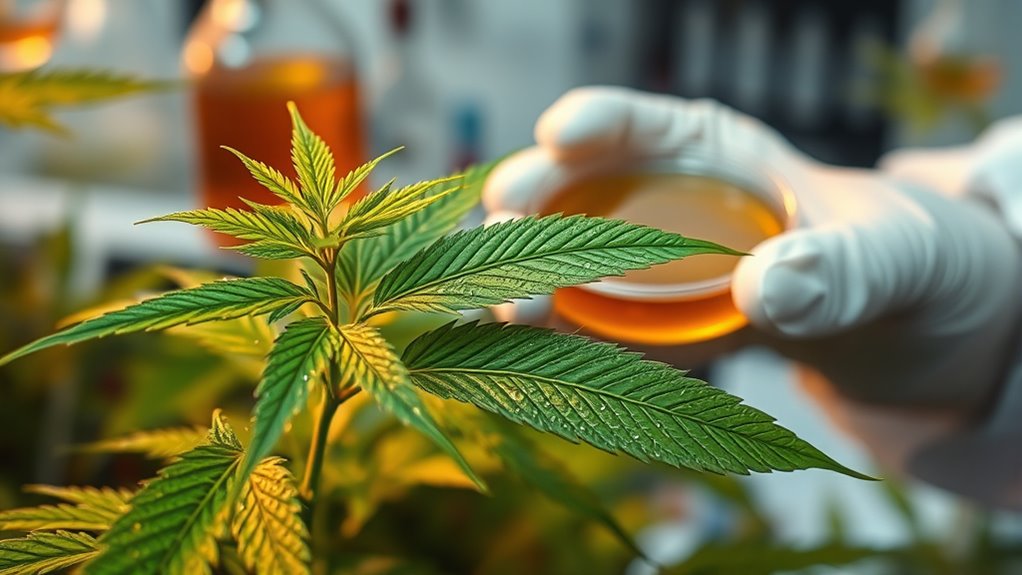Research shows that CBD interacts with your body’s endocannabinoid system, mainly targeting CB2 receptors in immune cells, which helps regulate inflammation without suppressing your entire immune response. It can reduce pain and inflammation by calming overactive immune reactions and blocking pro-inflammatory substances. While promising, individual responses vary, and ongoing studies are exploring its full potential. To discover more about how CBD may help manage inflammation, keep exploring the latest scientific insights.
Key Takeaways
- CBD interacts primarily with CB2 receptors in immune cells, helping regulate inflammatory responses without suppressing the immune system.
- Scientific evidence indicates CBD reduces inflammation by modulating immune activity and decreasing pro-inflammatory substances.
- CBD may alleviate inflammatory pain by influencing pain signaling pathways and reducing sensations caused by inflammation.
- Activation of CB2 receptors by CBD helps control immune responses and decreases excessive inflammation.
- Ongoing research suggests CBD has potential as a complementary therapy for inflammation, but more studies are needed on dosage and long-term effects.

Have you ever wondered how CBD might help reduce inflammation? It’s a common question, especially for those seeking natural relief from chronic pain or swelling. When your body experiences inflammation, your immune response kicks into gear, releasing chemicals that can cause pain, redness, and swelling. CBD, short for cannabidiol, is believed to influence this process by interacting with your body’s endocannabinoid system, which plays a major role in regulating immune response and maintaining balance.
Research suggests that CBD may modulate immune activity, helping to calm an overactive immune response that leads to excessive inflammation. Instead of suppressing the immune system entirely, CBD appears to support a more balanced reaction, which can be essential in managing conditions characterized by chronic inflammation. This potential to influence immune response is promising because it means CBD might reduce the intensity of inflammation without compromising your body’s ability to fight off infections.
CBD may help balance immune response and reduce chronic inflammation without suppressing immunity.
When it comes to pain relief, CBD’s benefits are also significant. Many users report a decrease in pain levels after using CBD products, which is backed by scientific studies showing CBD’s ability to interact with receptors involved in pain signaling. By influencing these pathways, CBD may help diminish the sensation of pain caused by inflammation, providing a more comfortable state of well-being. This makes CBD a compelling option for those suffering from inflammatory conditions like arthritis, where pain and swelling often go hand in hand.
The way CBD may reduce inflammation and relieve pain ties back to its interaction with specific receptors in your body. It activates CB2 receptors, which are primarily found in immune cells and tissues involved in inflammation. When these receptors are stimulated, they can help regulate inflammatory responses and reduce the release of pro-inflammatory substances. This process not only addresses the symptoms but may also target some underlying causes of chronic inflammation, especially in autoimmune conditions.
Additionally, ongoing research highlights the importance of understanding the potential risks and benefits associated with merchant services as more businesses adopt CBD products and related therapies. While the science continues to evolve, early evidence suggests that CBD has a modulatory effect on immune response and pain pathways, making it a noteworthy natural option for managing inflammation. It’s important to note, though, that individual responses vary, and more research is needed to determine best dosages and long-term effects. Nonetheless, many people find that incorporating CBD into their wellness routine helps them manage inflammatory discomfort more effectively, offering a potential alternative to traditional medications with fewer side effects.
Frequently Asked Questions
Can CBD Replace Anti-Inflammatory Medications Entirely?
You wonder if CBD can replace anti-inflammatory drugs entirely. While CBD shows promise for reducing inflammation, current evidence isn’t strong enough to confirm its efficacy as a complete substitute. Anti-inflammatory drugs are well-studied and proven effective for many conditions, whereas CBD’s effects vary. It’s best to consult your healthcare provider before replacing prescribed medications with CBD, as they can guide you based on your specific health needs.
Are There Any Long-Term Side Effects of Using CBD for Inflammation?
You might worry about long-term safety when using CBD for chronic use, but research is still evolving. While current evidence suggests CBD is generally well-tolerated, some people report side effects like fatigue or changes in appetite. Long-term use hasn’t shown significant adverse effects yet, but because research is limited, you should consult your healthcare provider for personalized advice. Staying informed helps you make safe choices for your health.
How Does CBD Interact With Other Medications for Inflammation?
When you take CBD alongside other medications for inflammation, you should be aware of potential drug interactions. CBD can affect hepatic metabolism, which is how your liver processes drugs. This may alter the effectiveness of your other medications or increase side effects. Always consult your healthcare provider before combining CBD with other treatments, especially if you’re on medications that are metabolized through the liver, to guarantee safety and proper management.
What Is the Recommended Dosage of CBD for Inflammation Relief?
Imagine tuning a radio to the perfect station—that’s what personalized dosing is like for CBD. For inflammation, start with low doses, around 10-20 mg daily, and gradually increase until you notice relief. Dosage guidelines vary based on body weight, severity, and individual response. Always consult a healthcare professional for tailored advice, ensuring your dose hits the right frequency without distortion.
Is CBD Effective for All Types of Inflammatory Conditions?
You might wonder if CBD is effective for all inflammatory conditions. While CBD works by interacting with the body’s endocannabinoid system and influencing inflammatory pathways, its effectiveness varies depending on the specific condition. Some inflammatory issues respond well, thanks to CBD’s mechanisms, but others may not see the same benefits. Always consult a healthcare professional to determine if CBD suits your particular inflammatory condition.
Conclusion
So, it’s interesting to see how CBD’s potential to reduce inflammation aligns with ongoing research, almost like nature and science are dancing in step. While the evidence is promising, it’s no coincidence that many users report relief just as new studies emerge. Keep in mind, science continues to evolve, and what’s true today might shift tomorrow. So, stay curious, stay informed, and remember—sometimes, the best discoveries happen when you least expect them.










